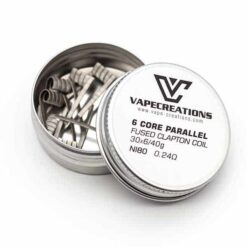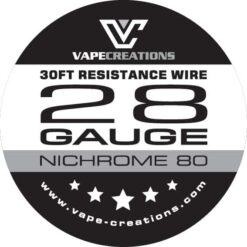Many vapers like to build their own coils, a process that includes choosing the right vape wire to suit your vaping needs and preferences. Both the type and size of wire influence factors such as vapour production, flavour, and ramp-up time. Some wires are also easier to work with than others. Knowing the differences between wire types is essential to find one that suits your vaping preferences, so dive in with us as we get into different vape wires and how you should use them.
Vape Wire Characteristics
Although each vape wire type has its own characteristics and strong suits, there are some common characteristics that apply to all wire types. These include the wire gauge, resistance, and ramp-up time.
- Gauge: The gauge number of your wire is related to its diameter – as the gauge number increases, the diameter decreases.
- Resistance: The higher your gauge, the higher your coil resistance will be. The amount of wire you use also affects the resistance – more coil length means higher resistance and vice versa.
- Ramp-up time: This refers to the amount of time it takes for your coil to reach the optimal temperature necessary for vaporising e-liquid. Lower gauge wires generally have longer ramp up times due to their large mass.
- TCR: The temperature coefficient of resistance (TCR) of a wire is the increase of resistance as the temperature increases. This is useful for mod kits with temperature control settings, where it can modulate the temperature of your wire to prevent burning and keep your experience more consistent.
Common Types Of Vape Wires
Different types of vape wires have specific characteristics that make them more suitable for certain vaping experiences. Some of the most common types of vape wire materials include:
- Kanthal
- Nichrome
- Stainless Steel
Kanthal
Kanthal wire is an alloy with good resistance to oxidation that is most commonly used for vaping in variable wattage mode. This is a good option for beginners who are just starting to get into rebuilding, dripping, and mods in general. It is easy enough to work with and stiff to keep its form when you shape it into a coil. It is the most popular primary wire vapers use when they build single-wire coils. However, Kanthal wire is not compatible with TC.
Pros of Kanthal wires include:
- Easy to work with
- Keeps its shape
- Variable wattages
- Widely available
- Inexpensive
Nichrome
Nichrome wire is another alloy that is suitable for variable wattage mode vaping. It is very similar to Kanthal, but it heats up faster and has a lower resistance. Since Nichrome’s melting point is lower than Kanthal’s, you need to be more careful when dry burning your coils as they can burn open more easily. Start at a low wattage and periodically pulse the coils rather than hitting them at maximum wattage while they are dry.
Note that Nichrome wires are not compatible with TC. Nichrome also contains Nickel, so steer clear of Nichrome wires if you have any Nickel allergies.
Pros of Nichrome wires include:
- Faster ramp-up time than Kanthal
- Easy to work with
- Keeps its shape
- Widely available
Stainless Steel
Stainless Steel is probably the most unique out of the common vaping wires since it can be used for vaping in variable wattage mode and TC mode. Stainless Steel is easy to work with, has a fast ramp-up time, and is widely available in physical and online stores. Do not dry burn your Stainless Steel wire at high wattages when cleaning your build or looking for hots pots since this might release unwanted chemical compounds. Rather build spaced coils that do not need to be pulsed for hot spots.
Pros of Stainless Steel wires include:
- Suitable for variable wattage vaping and TC vaping
- Fast ramp-up time
- Easy to work with
- Keeps its shape
- Widely available
Kanthal Vs. Nichrome Vs. Stainless Steel
Most vapers prefer to vape in power mode, which all three of the above mentioned wire options are suitable for. However, each wire type will deliver a slightly different experience. First of all, avoid Nichrome coils if you have a Nickel allergy. Stainless Steel wires also usually contain small amounts of Nickel, so rather stick to Kanthal.
Kanthal has been a favourite in the vaping community for a long time due to its malleability and higher resistance. Mouth to lung (MTL) vapers prefer 26-28 gauge Kanthal wires, and their lower ramp-up time can satisfy MTL vapers who like taking slower, longer draws.
Nichrome and Stainless Steel are perfect power mode wires for those who vape at lower resistances. They can provide a satisfying vaping experience for MTL, DTL, and RDTL users alike. Most users also report that they experience better flavour with Nichrome and Stainless Steel builds.
Other Types Of Wires
Two other common wire types include Nickel and Titanium. Both of these wires can only be used in TC mode. Nickel is easy to find, but it is also a common allergen and very difficult to work with. Titanium is easy to work with and provides full flavour, but it is hard to find since some people question its safety for use as vaping coils.
Wire Type Comparison
| WIRE TYPE | CHARACTERISTICS | WATTAGE MODE? | TC MODE? |
| Kanthal | Fast ramp-up time Easy to work with Inexpensive | Yes | No |
| Nichrome | Excellent ramp-up time Easy to work with Widely available | Yes | No |
| Stainless Steel | Fast ramp-up time Easy to work with Clean, full flavour | Yes | Yes |
| Nickel | Widely available Difficult to work with Known allergen | No | Yes |
| Titanium | Easy to work with Difficult to find Potentially unsafe | No | Yes |
Getting the most out of your vaping experience should always be a top priority, and if you are new to mods, knowing which vape wire to pick is part of the deal. If you are unsure about what you like, experiment with different coil builds and inhalation techniques until you find what works best for you. Kanthal, Nichrome, and Stainless Steel are great options for coil building, while you can choose between Nickel and Titanium wire as well, just make sure that you use the appropriate coil type for variable wattage mode or TC mode as indicated.
-
Hellvape Dead Rabbit R 10pc 0.2 ohm Coil Pack
R85.00 -
Vape Creations – 6 Core Parallel
R175.00 -
Vape Creations Wire
R32.00 – R72.00Price range: R32.00 through R72.00 -
Vape Creations – 5 Core Parallel
R165.00










